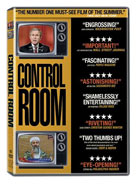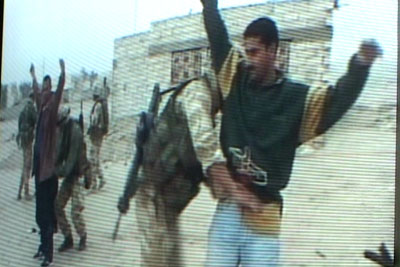 BUY IT AT AMAZON: CLICK HERE!
BUY IT AT AMAZON: CLICK HERE!
STUDIO: Lions Gate Home Entertainment
MSRP: $26.98 RATED: NR
RUNNING TIME: 86 Minutes
SPECIAL FEATURES:
• Audio Commentary with Director Jehane Noujaim and Producer/Cinematographer Hani Slama
• Audio Commentary with Captain Josh Rushing, Central Command Press Officer
• Audio Commentary with Al Jazeera Senior Producers Hassan Ibrahim and Samir Khader
• Extensive Deleted Scenes
• Theatrical Trailer
Al
Jazeera is the propaganda mouthpiece of Islamic fanaticism in the
Middle East. It has a virulent anti-American stance and is a tool of
terrorists. You know all of this even though you have never seen a
minute of the Arab news network, since American news networks and the
US government have told you so.
Control Room
doesn’t set out to disabuse you of this notion, but that’s exactly what
it does. In a year veritably crammed with excellent and important
documentaries, this is quite possibly the best and most important of
them all. As the war in Iraq drags endlessly into the foreseeable
future, Control Room may be the only opportunity for many Americans to
understand a different perspective on what’s going on.
The Flick

Even with the impressive ILM Bird Swarm, Al Jazeera couldn’t get Birdman of Abu Gharaib off the ground.
Director
Jehane Noujaim began filming the goings on at Al Jazeera headquarters
in the days leading up to the American invasion of Iraq. She follows Al
Jazeera reporters and producers, as well as a US Marine Corps press
liaison, through the days of fighting and occupation, giving viewers
not only an incredibly candid look inside of what a news network on a
war footing is like, but also how the fundamental differences between
the Arab and Western points of view skew everything.
One of the things that Control Room
does is to make us face just what the hell objective journalism even
is. The concepts of what objective journalism in the United States is
are built on such fundamental biases that we don’t even notice them –
one of them is that a democracy is inherently good. That’s something so
ingrained in our everyday lives that we never stop and think about the
subjectivity of it. It’s important to keep that sort of bsasic bias in
mind when examining Al Jazeera.
The
film sets out a good history of the network. We learn that Al Jazeera
has been kicked out of some Middle Eastern nations, who see it as
against the current regimes. We see footage of Donald Rumsfeld
denouncing the network as apologizing for the Saddam regime. We see
footage of Saddam’s information minister denouncing the network for
spreading American propaganda. See a pattern here?

Coming from Rockstar Games in 2008: Grand Theft Auto: Baghdad.
The
Middle East today, as we see in the movie, is a complicated place. It’s
a region torn between almost medieval values and a postmodern economy.
It’s a place that is all about cultures in conflict, and what Al
Jazeera seems to be doing is reaching out to these cultures and trying
to wake them up. That’s actually what one of Al Jazeera’s producers,
Samir Khader says in the film, which seems to contradict more or less
every single thing that you hear about the network.
Hearing,
of course, is not believing. The film shows the network in action, but
perhaps most importantly it shows the network on the night the bombing
starts. As an American with very limited experience in war – 9/11, an
event that happened on my proverbial doorstep, is as close as I have
been, and that’s closer than many Americans – it’s illuminating to
watch the Al Jazeera studio as the bombing of Baghdad begins. They’re
shocked and horrified and it’s far too close – it’s like living in
Illinois and seeing Wisconsin bombed. As Americans we too often don’t
understand the connection between the Arab states – this helps.
But
beyond that the film addresses impartiality directly. Al Jazeera’s web
site manager claims you cannot be impartial in the face of a foreign
invasion of your region, and that seems impeccably fucking reasonable.
What it comes down to is that impartial reporting and objectivism is
defined by where you live in relation to where the reported events
occur.

Witness the Super Happy Fun Occupation Army helping local Iraqis adjust their belts in the face of even more savage rationing!
Of
course the movie would get old soon if the characters only explored
that. In Josh Rushing, the Marine PR man, Noujaim has managed to find
what is the ultimate American. Open, caring, truly believing in the
ability of American goodwill to bring happiness and light to the rest
of the word, this guy is completely Steve Rogers, mom and apple pie
American.
So
it’s astonishing to watch the transformation of Rushing. The Al Jazeera
reporters, including the roly-poly Hassan Ibrahim don’t go even near
the emotional places Rushing does, making him the most intriguing
character. There’s a scene where Rushing talks about seeing American
POWs on TV and being horrified and then realizing that he was never so
moved by seeing footage of dead Iraqi civilians that is just amazing.
It fills you with hope for our enlisted men and women – there IS a
learning curve, and the American people, even the most indoctrinated,
can learn to understand that people in foreign countries have feelings
too.
There’s
more, of course. The movie follows the network through the days of the
war, with reporters who are obviously committed to the truth. These are
people despised on all sides and who take it as a sign of their
journalistic integrity. It’s funny to hear a Marine PR person describe
Al Jazeera questions as “combative” and realize he just means “not
taking my word for it.” It’s scary, however, to realize that truth
needs to be discovered by foreign journalists. In the film we see
American journalists come to the Al Jazeera office at the Central
Command for the good food and friendly company, but it seems like they
never learn the basic aspects of journalism that the Arab reporters
understand.

Knowing
that his electoral victory gave him an unstoppable mandate, George W.
Bush recklessly killed the Marine honor guard with his secret Skull and
Crossbones judo chop.
What makes Control Room
most important, though, is that it allows us to see world events
through the eyes of other people. We live in a world where we can get
instant news from across the globe, but can we understand how those
events are viewed by the people for whom it is happening? That’s the
essential question of the movie, and Control Room makes us question
whether more knowledge is the same as more understanding.
In
the end there’s much more to the film, including documentary evidence
of the murder of journalists at the hands of the US military (a charge
repeated by journalists across the globe in this case), but I think
that the film is far more important than the details of the war in
Iraq. Control Room
establishes itself as the best and most essential documentary of 2004
in the evenhanded way that it presents both side of the war spin
machine, but most especially in the way that it makes us understand why
each side spins the way it does.
9.1 out of 10
The Look

"Freedom’s untidy." – Genius Donald Rumsfeld on the looting of Baghdad.
Control Room
was shot on digital video, and the transfer here seems immaculate. It’s
a movie often filmed with a handheld camera, so don’t go in expecting
that much; still, the clear picture and often deep colors capture the
alien surroundings of the Middle East quite well.
7.0 out of 10
The Noise
Again,
this is a documentary – you’re not getting the latest in THX sound. You
can hear everything fine, so there are no complaints to be made here at
all.
7.0 out of 10

"Doctor,
it hurts when a foreign imperial force invades my nation under
completely false pretenses and then blows up one hundred thousand
innocent civilians by accident with thier laser guided so-called smart
bombs!" "So don’t do that!"
Alternate caption: "Freedom’s untidy." – Donald Rumsfeld.
The Goodies
This
is where the disc really excels. The producers of the DVD have gotten
most of the pertinent people together for three separate commentaries.
One with director Jehane Noujaim and cinematographer Hani Salama is
great because they really let you in on what it was like to make a film
with as unsure an outcome as this one. They headed to the Middle East
without all the right credentials and without permission from Al
Jazeera, and the documentary was often a run and gun operation. It’s a
good commentary, spoiled only by the fact that you can’t see Jehane – I
met her at the New York Film Festival and she’s pretty hot.
The
second track is with Josh Rushing, who has had some troubles with the
military since coming home. His track is a touch disappointing, since
he’s just a damn nice guy. He doesn’t get as much into the dirt as you
might like, but he’s thoughtful, so he brings a lot to the track anyway.

The Middle Eastern Marx Brothers (100% fewer Jews!) practice their new stage production of Duck Soup.
Finally,
there’s the Al Jazeera track with Hassan and Samir. They’re mildly
bitter yet hopeful, since they recorded the track at a point when the
peace in Iraq seemed winnable. The commentary is a nice peek into how
they viewed the war, but it can be frustrating at times for those not
good with accents.
There are also a host of deleted scenes, most of which were interesting but not essential.
8.5 out of 10
Overall: 9.1 out of 10